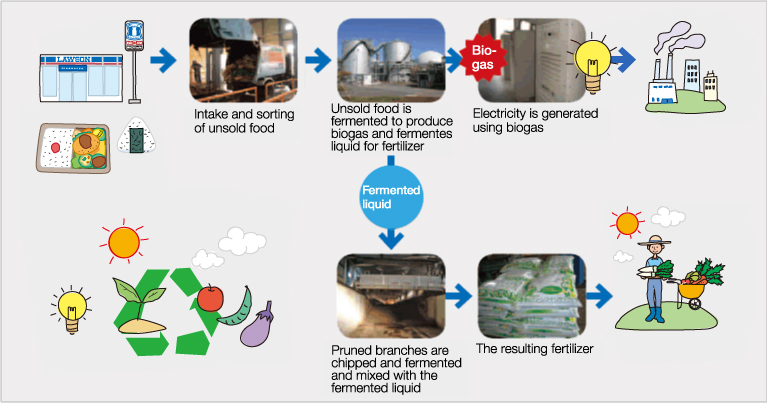SUSTAINABILITY Waste Reduction
Reduction of Waste Generation and Recycling
Measuring In-Store Waste
Lawson continuously collects information on waste from stores for use as basic data in the promotion of waste reduction and recycling.
In fiscal 2019, average daily non-food waste per store amounted to 38.7 kg (data from 500 stores in Tokyo). Daily food waste averaged 8.4 kg, comprising 5.9 kg in unsold food and 2.5 kg in used cooking oil (data from the approximately 2,800 LAWSON stores that conduct food recycling).
- Average Daily Waste per Store
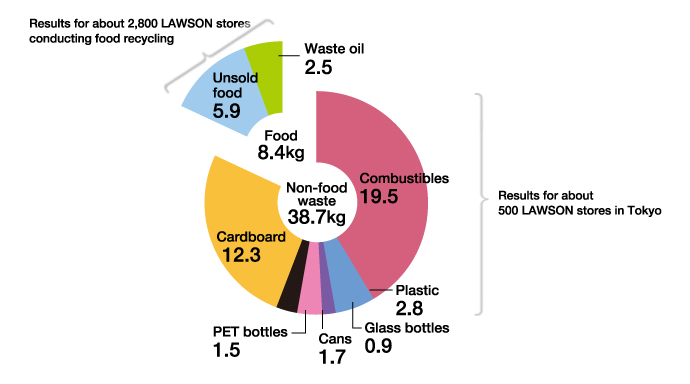
-
- The sum of food and other waste is 47.1 kg.
- Survey period: April 1, 2019 to March 31, 2020
Reducing Food Waste at Stores
- Cutting Waste Generation and Promoting Recycling
- In one day the average store generates unsold food, such as boxed meal-type foods that have exceeded their sell-by dates,* and cooking oil used in the preparation of fast foods, a total of 8.4 kg of food waste. Our efforts to reduce these types of food waste center on curbing the generation of waste and on recycling (the recycling of used cooking oil and converting surplus food into livestock feed or compost).
- 50.2% Food Recycling Ratio
- Lawson and its Group companies strive to increase the food recycling ratio to effectively use surplus food and comply with Japan’s Food Recycling Law. Beginning from a baseline of 22.5% in fiscal 2007, we set the goals of improving our recycling ratio by at least 2 points each year. Thanks to these efforts, in fiscal 2019 we achieved a food recycling ratio of 50.2%, well in excess of the statutory target of 46.5% or above.
* Sell-by date: A date voluntarily set before the use-by date so that customers can buy safer products with confidence

Lawson Group Number of Stores Conducting Food Recycling
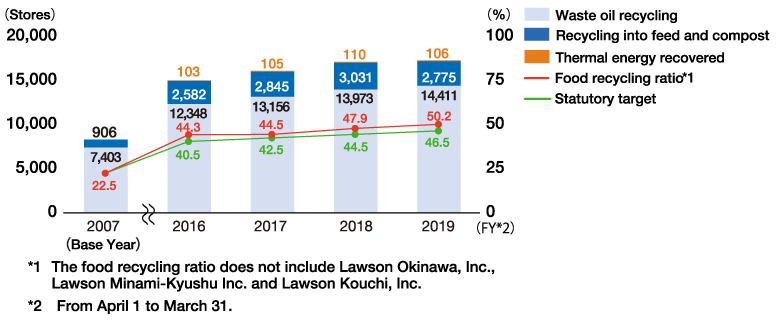
Initiative 1:
Curbing Waste Generation
- Minimizing Unsold Products and Waste
- In order to cut waste at the manufacturing stage, we have introduced the Production Process Management System, which entails carefully measuring ingredients used, product volume, and servings down to the gram.
We work to reduce waste by optimizing the merchandise assortment in stores. Sales data and purchasing data gathered through the multi-partner loyalty point program Ponta* is analyzed, taking into account such influences on the number of customers as day of the week, weather patterns, and regional events. Such efforts help us determine the optimal volume and assortment of merchandise for each store. This allows greater precision in ordering and helps reduce waste.
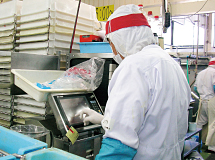
- Curbing waste by carefully measuring raw materials at a rice dish factory
Initiative 2:
Recycling - Waste Oil
- 14,411 Lawson Group Stores Recycle Used Cooking Oil
- Lawson began recycling waste oil in January 2006; as of March 31, 2020, 14,411 Group stores were participating. Industrial waste collection and transport contractors collect waste oil from stores, delivering it to recycling plants. There, it is processed into livestock feed additive, biodiesel fuel, and additive-free soap.
Lawson’s headquarters recommends companies that meet certain standards as business partners for stores, working through three management companies (in east Japan, west Japan, and Kyushu). Headquarters, the management companies and the headquarters-recommended partner companies closely collaborate to ensure and improve legal compliance, management standards, and quality of collection service.
Once a year, we invite partner companies from around Japan to participate in our Regular Waste Oil Recycling Meeting. Attendees share information and opinions and discuss challenges and solutions.
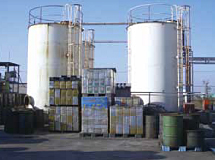
- Waste oil recycling plant
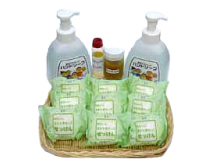
- Products made with recycled oil
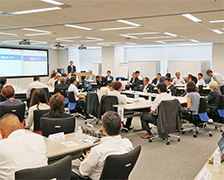
- Regular Waste Oil Recycling Meeting
Initiative 3:
Recycling - Food
- Expanding Food Recycling Coverage
- Initiated in May 2006, waste food recycling by LAWSON stores had been adopted by 2,775 stores in the Lawson Group as of March 31, 2020. Boxed meals and other foods that have exceeded their sell-by dates are recycled into livestock feed and compost.
The Lawson Group is working to overcome challenges related to selecting food recycling plants and waste collection/transportation companies as well as the cost of recycling, aiming to expand the territory covered by its sustainable food recycling efforts.
In Toyama Prefecture and Nagaoka City, Niigata Prefecture, the recycling of unsold food from LAWSON stores includes fermentation to produce biogas*, which is then used to generate electricity.
*Biogas: Gas produced by fermenting such materials as food waste, sewage, or grain for use as fuel.
Area where unsold food products recycling area
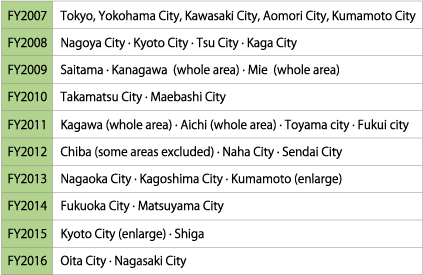
- Example of Food Recycling 1
- We began recycling unsold food into feed in Fukuoka City in October 2014. Unsold food is sent from the stores to a KANKYOU AGENCY CO LTD food recycling plant, where it is crushed, decompressed, dried, processed into feed and then shipped to pig farmers and feed manufacturers.
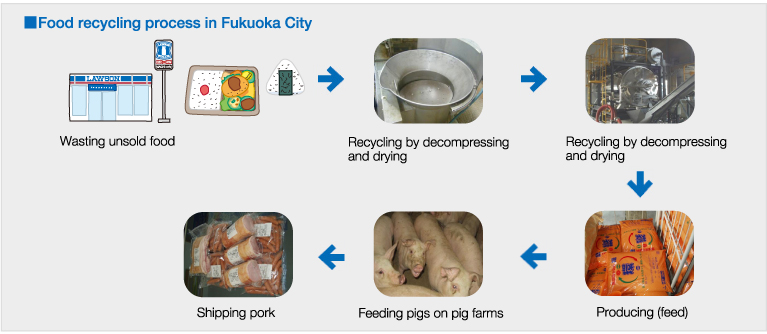
- Example of Food Recycling 2
- Lawson recycles unsold food from stores in five Toyama Prefecture municipalities, namely Toyama City, Imizu City, Kamiichi Town, Tateyama Town, and Funahashi Village. Unsold food from stores is transported to the recycling facilities of Toyama Green Food Recycle, Inc., where it is fermented to produce biogas and a liquid. The biogas is then used to generate electricity, which helps power the recycling facilities, while the fermented liquid is mixed with woodchipped, fermented tree prunings to create fertilizer.
